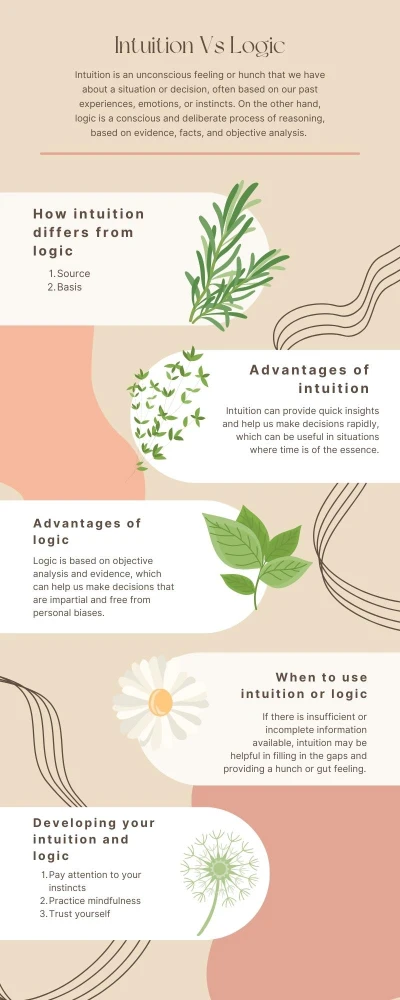We make hundreds of decisions every day. Some are simple, like what to wear or what to eat for breakfast. Others are more complex, such as whether to change jobs or invest money in the stock market.
According to a 2022 study published in the Journal of Cognitive Science, participants who received training in logical reasoning skills made decisions that were less prone to biases and cognitive errors.
Over the 4 week training period, their decision-making accuracy increased by 14% on average. Researchers concluded that “strengthening skills in conscious analytical thinking can enhance people’s ability to make rational, fact-based judgments.
When facing these decisions (Intuition vs Logic), should you rely on your intuition (your gut instinct) or logic (conscious analysis of facts and data)?
The answer isn’t straightforward. Each approach has its advantages and downsides. The ideal is finding the right balance of intuition and logic for the situation. Properly balancing intuition and analysis takes practice. But it’s a crucial skill for minimizing regrets and making the best possible choice each time.
What is Intuition and How Does It Work?
Intuition is your ability to understand something instinctively without the need for conscious reasoning. It’s the “gut feeling” or hunch that seems to come out of nowhere when making decisions.
Intuition arises from the rapid, unconscious processing of previous experiences and patterns. Your brain takes shortcuts to quickly piece together ideas and insights based on your accumulated knowledge.
This all happens in mere seconds, giving intuition its fast, automatic quality. You get a “feeling” about something without logically thinking it through.
Some key benefits of intuition are:
- Swift decision-making with limited information
- Recognizing patterns and connections
- Synthesizing various sources of information
- Creativity and “thinking outside the box”
Intuition is crucial in many professions like counseling, policing, firefighting, and health care, where quick judgment calls are needed. Experienced professionals develop strong intuitive skills over many years in their field.
Overall, intuition provides a rapid, holistic perspective based on our accumulated experience and knowledge. But it can sometimes lead us astray.

What is Logical Thinking and Its Advantages
In contrast to intuition, logical thinking involves the conscious, step-by-step analysis of information. It’s a slower, deliberate process that weighs facts and evidence to conclude.
Logic relies on reason and rationality rather than “gut feel.” It removes emotion from the equation and reduces the influence of biases.
Some benefits of logical thinking include:
- Methodical evaluation of data and facts
- Identifying patterns objectively
- Testing assumptions and minimizing biases
- Drawing conclusions based on sound evidence
- Avoiding emotional impulses and mental shortcuts
Logic is essential for fields like science, engineering, law, accounting, and analytics. These professions depend on objective analysis of verifiable information.
Overall, logical thinking provides an analytical, structured approach to evaluating options and making fully informed choices. But over-reliance on logic also has downsides.
Key Differences Between Intuition and Logic
Let’s summarize the core differences between intuition and logic:
- Speed: Intuition is fast, while logical thinking is slower and more methodical. Intuition arrives in an instant based on experience. Logic requires gathering and analyzing information.
- Conscious Effort: Intuition is unconscious pattern recognition. Logic uses deliberate, conscious analysis.
- Basis: Intuition stems from accumulated experiences and mental shortcuts. Logic relies on verifiable facts and evidence.
- Biases: Emotions, biases, and mental errors can sway intuition. Logic minimizes biases by focusing just on facts.
- Certainty: Intuitions feel certain but could be wrong. Logical conclusions are provisional based on the available evidence.
- Applications: Intuition is better for quick decisions and creative tasks. Logic is preferable for complex analysis and high-stakes choices.
Neither intuition nor logic alone is perfect. The best approach depends on the context and goals of the decision.
Now, let’s explore when it’s better to trust your intuition over logic and vice versa.
When Should You Trust Your Intuition Over Logic?
There are certain situations where going with your gut instinct is better than over-thinking things:
When You Need to Make Fast Decisions
If you need to decide something on the spot with limited time and information, intuition is your friend. Logic requires carefully gathering and analyzing data – which simply isn’t possible with snap decisions. Relying on your rapid hunches is often better than not choosing at all.
When Your Intuition Comes From Years of Experience
Intuition gets stronger with extensive real-world experience in a field. A seasoned doctor quickly knows which treatment route is best for a patient based on intuition rather than analyzing every medical study. Trust intuition more as your expertise develops.
For Creative Tasks Like Art, Music and Design
Logical thinking is too constrained for creativity. New ideas emerge intuitively by making unexpected connections. Logically analyzing every brush stroke would hinder artistic inspiration. Go with the creative flow.
When Data or Facts Are Lacking
Sometimes, you have to make a call when you lack sufficient data or facts. Rather than getting stuck over-analyzing, use your intuition to fill the gap and move forward. It’s often better than doing nothing.
Relying more on intuition than strict logic makes sense in these types of situations. When the stakes are lower and hard data is unavailable, intuition can provide quick insights and keep you from getting paralyzed by indecision.
But for high-stakes scenarios, logic should take precedence whenever possible.
When Is Logic More Reliable Than Intuition?
Logic should trump intuition in these types of scenarios:
For High-Stakes Decisions
When making important choices like investing life savings, assessing health risks, or choosing a job offer, do the logical analysis. Relying solely on intuition opens you up to potentially costly mistakes and biases. Take time to gather info and evaluate options logically.
For Complex Problems Requiring Math or Technical Skills
Logic shines when solving complex problems that require math, statistics, programming, engineering, or other technical expertise. Intuition alone won’t cut it for designing a bridge or developing software algorithms. Lean fully into logical thinking.
When You Lack Deep Experience
If you’re new to a field, your intuition will be underdeveloped and prone to flaws. Stick with logical analysis until you’ve built experience and expertise over the years. Reserve intuition for low-stakes situations while your skills improve.
When Eliminating Biases is Crucial
Logic helps remove emotions and mental blindspots from influencing your judgment. If you really need to view something objectively without biases skewing your thoughts, logical thinking is the way to go.
For serious or highly technical matters, logic provides greater accuracy and reliability. However, the downside is more time and effort spent consciously analyzing information.
The ideal balance depends on your goals. Next, let’s look at blending intuition and logic effectively.

Combining Intuition and Logic
The most effective approach is often to combine intuition and logic rather than choose one or the other. Here are some tips for integrating intuition with logical thinking:
- Use intuition to identify options, then analyze them logically to select the best choice. Intuitions can suggest possibilities that logic can evaluate.
- Double-check logical conclusions using your intuition and experience before making important decisions. Logic alone may miss key subjective factors.
- Identify irrational intuitions that contradict logic and try to understand where they come from before dismissing them. They may reveal useful insights upon deeper reflection.
- Build your intuitive skills over time by logically analyzing many experiences in a field to train your unconscious mind. Combining intuition and logic well takes practice.
- For very important decisions, have different team members make intuitive forecasts and then logically analyze reasons for differences. Multiple views followed by a discussion of logical reasons can yield the best result.
Potential Pitfalls of Overusing Intuition or Logic
Exclusively relying too much on either intuition or logic has risks. Here are some downsides of overusing one mode of thinking:
Pitfalls of overusing intuition:
- May yield decisions based on incorrect hunches and biases rather than facts.
- Provides little objective justification for choices made.
- Leads to stubborn adherence to intuitive beliefs even when contradicted by data.
- Lack of critical analysis of intuitive conclusions.
- Potential for emotion-based irrational decisions.
Pitfalls of overusing logic:
- Analysis paralysis from overthinking everything.
- Ignoring useful subjective insights and experience.
- Viewing everything as black-and-white without nuance.
- Oversimplification of complex decisions.
- Potentially cold or impersonal decisions that ignore human elements.
How to Find the Right Balance of Intuition and Logic
The most effective decision-making combines intuition and logic in the right proportions. Here are some tips:
- Gather enough reliable data and facts to conduct a thorough, logical analysis before making a final call. Don’t jump to an intuitive conclusion too quickly.
- Use logical thinking to test assumptions behind your intuitive judgments. This minimizes bias.
- For major decisions, consult experts to get additional informed intuition and logical perspectives. Multiple views give you more data points.
- When a decision doesn’t pan out, reflect on what went wrong. Over time, this helps sharpen your intuition by learning from experience.
- Don’t always default to one approach. The right mix of intuition and logic depends on each situation and goal. Practice assessing when to weigh each faculty.
Finding the ideal balance takes time and conscious effort. However, learning to integrate quick intuition with slower logical thinking leads to better outcomes.
Detecting when your intuition-logic balance is off-kilter is also important. If you notice any of these patterns, it may be time to recalibrate your intuition-logic balance based on the situation. Boosting each faculty takes practice.
Tips for Improving Your Intuition
Sharpen your intuitive skills with these methods:
Develop Your Area of Expertise
Put in the hours – intuition grows stronger with extensive hands-on experience in a field. The more situations and patterns you’re exposed to, the better your hunches become.
Keep a Decision Journal
Note when trusted intuitions were right or wrong. Look for any biases. Please review it periodically to enhance future intuition.
Expose Yourself to Diverse Viewpoints
Seeking broad perspectives beyond your own gives you more data to unconsciously synthesize. This expands your intuition.
Try Brainstorming and Mind-Mapping
Loose idea generation intuitive thinking over structured, logical analysis. Make unexpected connections.
Engage Your Creativity
Art, games, and activities like improv theater promote intuitive thinking. Have fun flexing this mental muscle.
With diligence, you can learn to tap into your intuition more effectively when logic alone falls short.
Tips for Strengthening Logical Thinking Skills
Increase your cognitive analytical abilities with these tips:
Take Time to Consciously Analyze Information
Don’t rush complex evaluations. Slow down and methodically examine data from all angles before deciding.
Study Logic, Math, Science Principles
Learn frameworks for evaluating claims and arguments objectively. Take a class on logic, statistics, or the scientific method.
Ask Good Questions to Test Assumptions
Play “devil’s advocate” against your intuitions. Question them rigorously to check biases.
Outline Your Reasoning Process Step-by-Step
Write out the logical steps in a decision to spot any lapses or contradictions you may have missed.
Solve Logic Puzzles and Brain Teasers
Practice conscious analytical thinking and problem-solving skills with fun challenges and games.
Strengthening logic takes mental discipline but pays dividends for complex or high-stakes choices.
Intuition vs Logic Worksheet
Here is a worksheet to help compare intuition and logic when making a decision:
| Question | Intuition | Logic |
| What is your initial gut feeling about each option? | ||
| What past experiences relate to the decision? | ||
| What emotions are coming up about the options? | ||
| What objective data is available about each choice? | ||
| What are the pros and cons of each option? | ||
| What logical sequence of reasons leads to a conclusion? | ||
| Which option aligns with your values? | ||
| Is there a logical fallacy in the reasoning? | ||
| Are biases influencing the gut feelings? | ||
| Is there time pressure to decide quickly? | ||
| Are there subjective factors beyond logic? | ||
| Which options still seem best after reflection? |
Use this worksheet when faced with an important decision to help engage both intuition and logic. Fill out the intuitive parts first, the logical parts, and then reflect on which option remains optimal after considering both.

Tips for Making Important Decisions
When making big decisions, like accepting a job offer or buying a home, use the following tips to balance intuition with logic:
- Set aside time to deliberately think through pros/cons logically before choosing based just on initial gut reactions. Don’t rush big judgments.
- Make lists of all the objective criteria that matter, then rank options. This prevents intuition from focusing on just one or two emotional factors.
- Avoid making a big decision after experiencing something extremely positive or negative to prevent emotional bias. Wait until intense states pass.
- Discuss options with people who have experience and views counter to your own to identify subjective blind spots.
- Sleep on it before finalizing the decision to give your unconscious intuitions time to process more data overnight.
- Imagine each option going extremely well AND extremely poorly to check if your intuition is realistic versus fantasizing unlikely best/worst case scenarios.
- Check if your intuition aligns with your values and life vision. Sometimes, a choice feels right intuitively, even if not optimal.
- Be wary of major life changes based on intuition alone. Use logic to carefully evaluate if it’s prudent first.
- Practice making small, intuitive choices to build trust in your judgment. Then, work up to relying on intuition for bigger decisions.
How to Have an Intuitive Conversation
Conversations rely heavily on intuition. Here are tips for having an intuitive interaction with someone:
- Listen closely to emotional undertones and body language, not just words. This picks up on what they truly think and feel about a topic.
- Pay attention to what topics elicit energy and enthusiasm versus those that frustrate or bore them. This reveals what they value.
- Occasionally sum up your intuitive understanding of their perspective. This tests if you are accurately empathizing.
- Time when you speak up based on intuition for when they will be most receptive. Don’t force advice when the moment doesn’t feel right.
- Ask about early role models and experiences that shaped them. This provides intuition into their personality.
- Observe how animated they are and modify your energy level to align intuitively. Matching their vibe helps connect.
- Share an intuitive impression you have about who they are and ask for feedback. This builds intuitive listening skills.
- Notice when your intuition about them contradicts their words. Explore these discrepancies respectfully.
How Intuition Changes with Experience
Intuition improves significantly with years of experience in any domain. Experts have far more refined intuition than novices. Here’s how intuition evolves with expertise:
- Your memory bank of relevant experiences to draw on expands greatly. This strengthens pattern recognition.
- You learn which factors really matter most, so your intuition hones in on key variables automatically.
- Irrelevant variables that used to grab your attention no longer compete with important intuitive cues.
- You develop intuitive discriminatory power to instantly filter out poor options instead of considering everything.
- Your confidence in your intuitive judgments grows, so you rely on them more.
- Contradictory intuitions and “noise” in your gut feelings diminish, so guidance becomes “crystal clear.”
- You feel intuitions physically in your body more intensely due to pattern familiarity.
Overall, seasoned intuition comes from learning what to pay attention to. It takes substantial experience for your intuition to prune away distracting factors. But intuition can skyrocket with diligent practice.
Let us try to understand When to Use Intuition and Logic with Examples
Example# 1
John is a firefighter with over 20 years of experience. One day, he responds to a call about a house fire downtown. When he arrives on the scene, the home is engulfed in flames on all sides. John needs to determine the fastest way to reach the young child trapped on the second floor.
Rather than consciously weighing all his options, John’s intuition kicks in. Based on thousands of past fires, he instantly feels that circling to the back of the house and then entering through the rear kitchen door is the optimal route.
He trusts this rapid gut instinct and acts on it right away. The swift, intuitive judgment call ends up saving the child’s life.
Example # 2
After years of working as a corporate accountant, Alicia dreamed of starting her own baking business. The logical data didn’t support the move – profit projections were weak, and she had little experience running a company.
But Alicia felt an instinctive passion for baking and a vision for the cute bakery she wanted to create. She tuned out the logical concerns and went with her intuition.
Despite naysayers, her biz took off and became a huge success. The intuitive spark of passion drove her well-judged risk-taking.
Trusting Intuition Requires Self-Confidence
Having strong self-confidence and self-trust is crucial for developing intuition. Without it, your logical doubts override your gut.
To build self-confidence:
- Identify your skills and past successes. Give yourself credit.
- Make a daily list of things you appreciate about yourself. This builds self-worth.
- Challenge negative self-talk. Don’t let failures define you.
- Associate with positive, encouraging people who believe in you.
- Step outside your comfort zone regularly to prove your inner resilience.
- Let go of perfectionism. You don’t have to optimize everything.
With greater self-confidence, you’ll learn to trust your inner guidance and withstand the doubts of pure logic.
Last Words – Intuition vs Logic
Intuition and logic both offer valuable but distinct ways of understanding the world. Intuition provides rapid insights based on experience. Logic allows systematic analysis of data.
Ideally, you want to integrate both modes fluidly. Seek enough information to make logical evaluations, but also pay attention to quick intuitive hunches that arise along the way.
The right balance depends on the situation. For creative tasks or quick choices, intuition suffices. For technical problems or big decisions, favor logic.
With practice, you can learn when to trust your gut, when to rely on facts, and how to blend these two crucial facets of intelligence.
The next time you face an important decision, take a moment to consciously consider whether intuition or logic – or both – is most appropriate. Avoid defaulting only to one.
By integrating intuition and analysis, you’ll often make smarter choices that benefit both from heart and head. You’ll minimize obvious pitfalls but also leave room for creative insights.
Finding this sweet spot leads to wiser decision-making and better outcomes. With some diligence, you can master the art of blending instinct and reason at the right times.
There is no universally better option. The ideal approach integrates both intuition and logic. Use intuition to quickly narrow down the options that feel right. Then, use logic and analysis to carefully evaluate the pros and cons of the intuitive picks and make a final decision.
Trust your intuition more when decisions involve social dynamics, values, creativity, and other subjective factors where logic has blindspots. Also, rely on intuition for very quick decisions or when you have deep expertise in a field.
Keep an intuition journal to record and analyze the accuracy of your past gut feelings. Also, build pattern recognition by reflecting on emotional connections to your experiences. Finally, discuss intuitions with others to get additional perspectives.
Highly intuitive people often thrive in careers like psychology, counseling, teaching, art, entrepreneurship, marketing, design, and other fields involving strong social intelligence or creativity.




